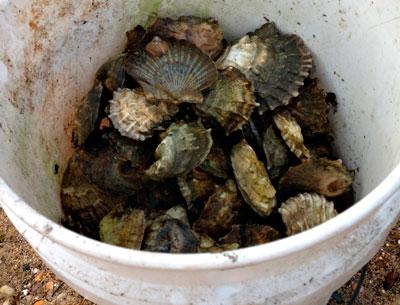On Shellfish, Stiffer Penalties, More Enforcement Sought

With the bay scallop season approaching and predictions of healthy harvests in Napeague and Three Mile Harbors, Nat Miller, an East Hampton Town Trustee and 13th-generation bayman, warned his fellow trustees at a meeting on Tuesday that “half of it’s going to walk away through illegal practices.” Poaching was “spiraling out of control,” he said, because enforcement of regulations was insufficient.
The trustees have been well aware that the culprit or culprits who breached and uprooted an 8,000-square-foot scallop sanctuary in Napeague Harbor last fall, one of two shellfish sanctuaries in town waterways, were never identified. The sanctuaries, created in 2009 in an effort to reseed waters with bug scallops after a die-off in the mid-1980s, are legally off limits to commercial and recreational fishing.
Furthermore, much of the work of the East Hampton Shellfish Hatchery, where millions of clams, oysters, and scallops are spawned and transferred to town waterways each year, is being squandered, Mr. Miller said. “It’s tax dollars that are walking away.”
The taking of oysters measuring less than three inches is prohibited. But, Mr. Miller said, commercial and recreational harvesters were violating the law. Commercial fishermen are allowed five bushels of oysters a day, he said, “But a lot of people have the mindset, ‘If I don’t take these two-and-a-half-inch oysters, someone else is going to take them. If this person is going to take seven bushels of scallops, I have to take seven bushels, because this is what I do year-round.’ This attitude is getting worse and worse and worse. Either we do something, or we get rid of all the laws.”
Instead of getting rid of regulations, however, Mr. Miller said penalties for violations are far too low. The shellfish hatchery staff and enforcement officers do great work, he said, “but there’s not enough of them, and they’re spread too thin.” Sean McCaffrey, a trustee, added. The trustees considered both a request that the town board stiffen penalties and hire a bay constable, who would work independently of Marine Patrol, to police the waterways.
Ed Michels, chief of the town Marine Patrol, said yesterday that more personnel would help with enforcement, but defended his department’s efforts and said that while the bay constable has been phased out, harbormaster is a higher position in criminal procedure law and performs the same duties. “There is no shortage of marine enforcement by having harbormasters instead of bay constables,” he said.
In addition to code enforcement of matters pertaining to boating, beaches, nature preserves, and parklands, the department has performed over 1,000 checks relating to shellfish and fin fish this year, resulting in 33 summonses issued for taking shellfish without a permit, in uncertified waters, or out of season, he said.
“I think we’d all like to have morepeople,” Mr. Michels said of government departments, “but these guys are working, and we’re getting the best we can get, I believe.”
“We have to make the other entities within the town that we work with aware of just how important this is,” Diane McNally, the presiding officer of the panel, said. “We’re just spinning our wheels unless we address it.” She suggested a meeting with Mr. Michels, Town Supervisor Larry Cantwell, Chief Michael Sarlo of the Police Department, and John Jilnicki, a town attorney, at which the trustees would make recommendations about penalties and greater enforcement.
“You’re going to have to make an example of someone,” Mr. Miller said. “Put the word out. Put some boats in the water.”
In other action, the trustees voted to extend the closure of Georgica Pond to all shellfishing, including crabbing, for another 21 days. Cyanobacteria, or blue-green algae, was first detected in Georgica Pond in July. The restriction can be lifted if water sampling determines that the algal bloom has dissipated.
Stephanie Forsberg, the trustees’ assistant clerk, advised her colleagues that Christopher Gobler of Stony Brook University, who is testing water quality in conjunction with the trustees, would like to conduct tests both before and after they open the pond to the Atlantic, which is traditionally on or around Oct. 15. Her colleagues agreed.
